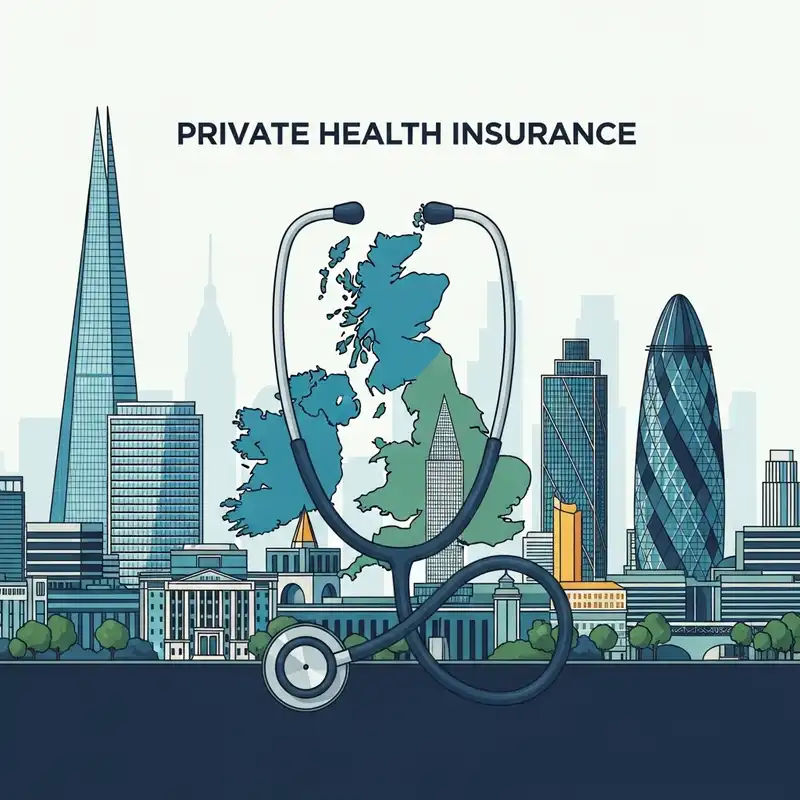TL;DR
Discover the UK's Regional Private Healthcare Excellence: Uncovering Specialist Networks for Elite Sports & Professions. UK PHI Beyond London Unmasking Regional Specialist Networks for Every Elite Sport & Profession For too long, the narrative around private health insurance (PHI) in the UK has been disproportionately focused on London, often overlooking the rich tapestry of medical excellence and specialist networks available across the nation. This London-centric view is not only outdated but also fundamentally misrepresents the sophisticated private healthcare landscape that now flourishes in regions far beyond the M25.
Key takeaways
- Convenience: Access to specialists close to home or work.
- Faster Access: Reduced waiting times for appointments and treatments compared to travelling to London.
- Local Expertise: Consultants often have deep ties to regional sports clubs, industries, and medical communities, fostering a more integrated approach to care.
- Cost-Effectiveness: While not directly affecting policy premiums, regional private care can sometimes be less expensive for certain procedures compared to their London equivalents, potentially impacting co-pays or excess charges if your policy has them.
- Maximum choice and flexibility.
Discover the UK's Regional Private Healthcare Excellence: Uncovering Specialist Networks for Elite Sports & Professions.
UK PHI Beyond London Unmasking Regional Specialist Networks for Every Elite Sport & Profession
For too long, the narrative around private health insurance (PHI) in the UK has been disproportionately focused on London, often overlooking the rich tapestry of medical excellence and specialist networks available across the nation. This London-centric view is not only outdated but also fundamentally misrepresents the sophisticated private healthcare landscape that now flourishes in regions far beyond the M25.
In an increasingly competitive world, elite professionals and athletes understand that their health is their most valuable asset. The demands placed upon them – whether it's a critical corporate deal, a gruelling training regimen, or a high-stakes performance – necessitate immediate access to top-tier medical care. This isn't just about general practitioner appointments; it’s about rapid diagnostics, access to world-leading consultants, and specialist rehabilitation tailored to unique physical and mental stressors.
This definitive guide aims to dismantle the myth that premium private healthcare is solely a London phenomenon. We will delve into how UK private health insurance can provide unparalleled access to regional specialist networks, offering bespoke medical solutions for individuals in high-pressure professions and elite sports, no matter where they are based in the United Kingdom. We will unmask the often-hidden gems of regional expertise, explore how these networks function, and crucially, explain how to navigate the complex world of PHI to secure the most fitting and effective coverage.
The Evolving Landscape of UK Private Health Insurance: Shifting Beyond the Capital
The UK's private healthcare sector has experienced significant growth and decentralisation over the past decade. While London remains a major hub, investment in private hospitals, clinics, and specialist units has surged in key regional cities and towns. This expansion is partly driven by increasing NHS waiting lists, but also by a growing demand from individuals and businesses outside the capital for readily accessible, high-quality private care.
Recent data underscores this shift. A report by LaingBuisson in 2023 indicated that while London still accounts for a substantial portion of private healthcare revenue, regional markets are exhibiting faster growth rates in certain specialities. This decentralisation means that a private medical insurance policy today offers a far broader reach than ever before, connecting policyholders to a national grid of consultants and facilities.
Why the Regional Focus Matters
For elite individuals, whether an athlete recovering from a career-threatening injury or a top-tier legal professional experiencing stress-related health issues, proximity to specialist care is paramount. Travel time, logistical challenges, and the inherent stress of navigating an unfamiliar city can significantly impede recovery and performance. Regional networks offer:
- Convenience: Access to specialists close to home or work.
- Faster Access: Reduced waiting times for appointments and treatments compared to travelling to London.
- Local Expertise: Consultants often have deep ties to regional sports clubs, industries, and medical communities, fostering a more integrated approach to care.
- Cost-Effectiveness: While not directly affecting policy premiums, regional private care can sometimes be less expensive for certain procedures compared to their London equivalents, potentially impacting co-pays or excess charges if your policy has them.
Understanding Private Healthcare Networks: Open Referral vs. Guided Options
When choosing a private health insurance policy, understanding the type of network you'll access is fundamental. Insurers primarily offer two models:
1. Open Referral Networks
This model provides the broadest choice. With an open referral policy, your GP can refer you to any specialist or hospital within the insurer’s approved list, which is typically extensive. You have a high degree of freedom in choosing your consultant and facility, provided they meet the insurer’s criteria and fee limits.
Pros:
- Maximum choice and flexibility.
- Ability to follow specific recommendations from trusted sources.
- Access to very niche specialists who might not be on every restricted list.
Cons:
- Often comes with a higher premium.
- Requires more active participation in choosing your provider.
- Potential for higher excess if you choose a very expensive specialist outside the insurer's typical fee schedule.
2. Guided (or Restricted) Networks
Also known as "guided choice" or "defined networks," this model directs you to a pre-selected list of consultants and hospitals. When your GP refers you, your insurer will provide a shortlist of approved specialists and facilities, often ensuring they are within a reasonable travel distance and meet specific quality and cost benchmarks.
Pros:
- Generally lower premiums.
- Simpler process as the insurer guides your choice.
- Often includes a curated list of high-quality, trusted providers.
Cons:
- Less choice and flexibility in selecting your specialist.
- You may not be able to see a specific consultant you had in mind if they are not on the network.
Table 1: Open vs. Guided Referral Networks
| Feature | Open Referral Network | Guided Referral Network |
|---|---|---|
| Choice of Provider | High – often any approved consultant/hospital | Limited – selected list provided by insurer |
| Premium Cost | Generally Higher | Generally Lower |
| Flexibility | High | Moderate |
| Consultant Access | Broadest range, including very niche specialists | Curated list, often preferred providers |
| Process | You choose from approved list | Insurer provides options based on referral |
| Best For | Those prioritising maximum choice and specific experts | Those seeking cost-effectiveness and simplified process |
Many insurers are now developing sophisticated "shared care" pathways within their guided networks, ensuring that even with a restricted choice, patients still receive excellent, coordinated care, often leveraging regional centres of excellence.
The Nexus of Elite Professions and Private Healthcare: Tailored Solutions
Individuals in high-pressure, high-stakes professions often face unique health challenges that benefit significantly from private healthcare's speed, discretion, and specialist access. The ability to quickly diagnose and treat conditions without lengthy NHS waiting lists means minimal disruption to their careers and peak performance.
Tailored PHI for Specific Professions
The demands of elite professions vary widely, and so do the potential health implications. A tailored PHI plan can address these specific needs.
Table 2: Common Health Challenges & PHI Benefits for Elite Professions
| Elite Profession | Common Health Challenges | PHI Benefits |
|---|---|---|
| Finance & Law | Stress, burnout, cardiovascular issues, back pain from long hours | Rapid access to mental health support, cardiology, osteopathy, physiotherapy; discreet consultations |
| Tech & Digital | Repetitive strain injury (RSI), eye strain, stress, posture-related issues | Ergonomic assessments, physiotherapy, ophthalmology, rapid diagnostics for neurological symptoms |
| Creative Arts (Musicians, Dancers, Performers) | Musculoskeletal injuries, vocal strain, performance anxiety, hearing loss | Specialised orthopaedics, vocal therapists, sports psychologists, ENT specialists; swift rehabilitation |
| Consultancy & Sales | Travel-related fatigue, digestive issues, stress, cardiovascular risk | Telemedicine, rapid diagnostics, gastroenterology, nutritional advice, executive health checks |
| Entrepreneurs & CEOs | High stress, sleep disorders, cardiovascular health, mental fatigue | Comprehensive executive health checks, mental health pathways, sleep clinics, stress management programs |
For instance, a senior legal partner in Manchester might require swift access to a discreet mental health professional to manage stress, or a top surgeon in Bristol might need immediate diagnostics for a hand injury. Regional networks ensure these professionals don't have to commute to London for top-tier care. Many private hospitals outside London, such as Spire Manchester Hospital, Nuffield Health Bristol Hospital, or The London Clinic (with satellite clinics) offer world-class facilities and specialists comparable to their London counterparts.
Safeguarding Elite Athletes: Specialised PHI for Peak Performance
Elite athletes operate at the physiological limits of the human body, making them particularly vulnerable to injury. For them, swift, expert medical intervention and rehabilitation are not just about health, but about career longevity and competitive edge. NHS waiting times can be detrimental to an athlete's recovery schedule, making private health insurance an indispensable tool.
PHI for athletes goes beyond basic care; it encompasses a holistic approach to performance, injury prevention, and rapid return to play.
Specialised PHI for Specific Sports
Each sport presents its own unique set of physical demands and injury risks. A comprehensive PHI plan should acknowledge these specific needs, offering access to relevant specialists and rehabilitation programmes.
Table 3: Common Sports Injuries & Relevant Regional Specialists
| Elite Sport | Common Injuries | Key Regional Specialists (Examples) |
|---|---|---|
| Football | ACL tears, hamstring strains, ankle sprains, groin injuries | Orthopaedic surgeons (knee, ankle), sports physiotherapists, soft tissue specialists (e.g., Manchester, Liverpool) |
| Rugby | Concussions, shoulder dislocations, knee ligament injuries, fractures | Neurologists (concussion clinics), orthopaedic surgeons (shoulder, knee), maxillofacial surgeons (e.g., Leeds, Bristol) |
| Athletics | Stress fractures, Achilles tendinopathy, shin splints, runner's knee | Biomechanics experts, sports podiatrists, orthopaedic surgeons specialising in lower limb (e.g., Loughborough, Sheffield) |
| Equestrian | Spinal injuries, fractures, concussion, joint pain | Spinal surgeons, neurosurgeons, orthopaedic trauma specialists (e.g., Newmarket, North Yorkshire) |
| Motorsport | Whiplash, concussion, impact injuries, chronic back issues | Orthopaedic spine specialists, neurologists, pain management clinics (e.g., Silverstone region, Oxford) |
| Dance | Stress fractures (foot/ankle), hip impingement, tendonitis, performance anxiety | Dance-specific physiotherapists, orthopaedic foot/ankle surgeons, sports psychologists (e.g., London, Manchester, Birmingham) |
| Cricket | Back stress fractures, shoulder injuries, hamstring strains | Sports medicine physicians, orthopaedic shoulder specialists, physiotherapists (e.g., Nottingham, Leeds, Southampton) |
Many private hospitals, particularly those in sports-intensive regions like the North West (football), the Midlands (athletics), or the South West (rugby), have developed highly specialised sports medicine clinics with multidisciplinary teams including orthopaedic surgeons, sports physicians, physiotherapists, osteopaths, and sports psychologists. For example, The Princess Grace Hospital in London is renowned, but clinics like The Spire Nottingham Hospital's sports medicine unit, or the Nuffield Health Cardiff and Vale Hospitals, offer equally advanced care tailored to athletes.
Navigating Regional Excellence: Beyond the M25
The UK boasts a remarkable network of private medical facilities outside London, many of which are centres of excellence in specific fields. Identifying these can be crucial for an optimal PHI experience.
Regional Hubs of Speciality
- Orthopaedics & Sports Medicine: Manchester, Leeds, Birmingham, Bristol, Nottingham, Cardiff, Glasgow. These cities often have strong ties to professional sports teams and have developed advanced orthopaedic and sports injury clinics. For example, The Alexandra Hospital (part of Spire Healthcare) in Cheadle, Greater Manchester, is highly regarded for orthopaedic and sports injury treatment, serving many professional athletes in the North West.
- Cardiology: Cities like Liverpool, Birmingham, and Edinburgh have leading private cardiac units that offer a full range of diagnostic and interventional cardiology services.
- Cancer Care: Specialist private oncology centres are distributed across the UK, including GenesisCare centres in various locations (e.g., Oxford, Nottingham, Leeds) offering advanced radiotherapy and chemotherapy.
- Neurology & Spinal Care: Centres in cities such as Sheffield, Oxford, and Cambridge are known for their neurological expertise and advanced spinal surgery units.
- Mental Health: While London has many options, dedicated private mental health hospitals and clinics exist in regions like the North East (e.g., Cygnet Health Care facilities), the Midlands, and Scotland, offering discreet and comprehensive psychiatric and psychological support.
Case Study: A Regional Success Story
Consider Sarah, a professional dancer based in Manchester. She develops a debilitating foot injury – a suspected stress fracture – which could jeopardise her career. Instead of travelling to London, her private health insurance policy provides rapid access to a specialist orthopaedic foot and ankle surgeon at a highly-regarded private hospital in Greater Manchester. Within days, she has an MRI, a confirmed diagnosis, and a tailored rehabilitation plan including physiotherapy and hydrotherapy, all coordinated locally. This efficient, regional access minimised downtime, stress, and travel costs, allowing her to focus entirely on recovery.
The Role of Insurer Networks
Most major UK PHI providers – Bupa, AXA Health, Vitality, Aviva, WPA, National Friendly, and others – have extensive regional networks. They meticulously vet and contract with hospitals, clinics, and consultants across the UK to ensure quality and cost-effectiveness. When comparing policies, it’s vital to understand the breadth and depth of their regional coverage for your specific needs. This is where an expert broker like WeCovr can be invaluable, helping you compare plans from all major UK insurers.
The Crucial Role of Specialist Networks in PHI
Specialist networks are the backbone of effective private medical insurance. They are not just lists of doctors; they represent curated ecosystems of highly qualified medical professionals, state-of-the-art facilities, and integrated care pathways designed to deliver optimal outcomes.
Why Are Specialist Networks So Important?
- Quality Assurance: Insurers rigorously vet specialists for their qualifications, experience, and clinical outcomes. This ensures you are treated by highly competent professionals.
- Coordinated Care: Within a network, there's often better communication between different specialists (e.g., a surgeon, physiotherapist, and pain management consultant working together on a complex case).
- Cost Management: By negotiating rates with network providers, insurers can manage costs, which in turn helps keep premiums more stable.
- Efficiency: Networks streamline the referral and appointment process, reducing administrative burden and waiting times.
- Access to Niche Expertise: For elite sports and professions, access to highly specialised areas like sports cardiology, performance psychology, or micro-hand surgery is critical, and these are often found within dedicated network hubs.
Deconstructing Your PHI Policy: What's Covered (and What Isn't)
Understanding the scope of your private health insurance policy is paramount. While PHI offers incredible benefits, it's crucial to grasp its limitations, particularly regarding chronic and pre-existing conditions.
Core Benefits of Standard PHI
A typical comprehensive UK private health insurance policy is designed to cover the costs of diagnosis and treatment for acute conditions that arise after your policy has begun.
Table 4: Key Benefits Typically Covered by Standard PHI
| Benefit Category | Description | Typical Coverage Details |
|---|---|---|
| Inpatient Care | Treatment requiring an overnight stay in hospital. | Hospital fees (room, nursing), consultant fees, diagnostic tests (X-rays, MRI, CT scans), drugs, surgical procedures. |
| Day-Patient Care | Treatment received in hospital but not requiring overnight stay. | Similar to inpatient, but for day procedures (e.g., minor surgery, endoscopy). |
| Outpatient Care | Consultations, diagnostic tests, and therapies not requiring hospital admission. | Consultant fees, diagnostic tests (e.g., blood tests, scans), physiotherapy, osteopathy, chiropractic treatment, mental health therapies (e.g., CBT, counselling). |
| Cancer Cover | Comprehensive care for cancer diagnosis and treatment. | Consultations, diagnostics, chemotherapy, radiotherapy, surgery, biological therapies, palliative care. Often a key selling point. |
| Therapies | Post-operative or injury-related rehabilitation. | Physiotherapy, osteopathy, chiropractic treatment, podiatry, sometimes acupuncture (limits apply). |
| Mental Health | Access to psychiatrists, psychologists, and therapists. | Inpatient and outpatient psychiatric care, counselling, CBT (limits and exclusions vary). |
| Health Checks | Some policies offer annual health checks or executive screens. | Preventative care, early detection. Often an add-on. |
The Critical Constraint: Pre-existing and Chronic Conditions
This is a non-negotiable aspect of standard UK private medical insurance. Standard UK private medical insurance does not cover chronic or pre-existing conditions.
- Pre-existing Condition: Any disease, illness, or injury for which you have received medication, advice, or treatment, or experienced symptoms, before the start date of your insurance policy. Insurers typically apply a moratorium period (e.g., 5 years) during which they won't cover conditions you've had in the past. After this period, if you haven't experienced symptoms or received treatment for the condition, it might become covered. Alternatively, some policies use "full medical underwriting" where all pre-existing conditions are declared upfront and either explicitly excluded or accepted from the outset.
- Chronic Condition: A disease, illness, or injury that has one or more of the following characteristics: it needs ongoing or long-term management; it continues indefinitely; it comes back or is likely to come back; it has no known cure; or it is permanently disabling. Examples include diabetes, asthma, hypertension, arthritis, and some mental health conditions. Private medical insurance is designed for acute conditions – those that respond quickly to treatment and are likely to pass.
In essence, private medical insurance is for new, acute conditions that arise after your policy begins. If you develop a chronic condition (like Type 2 diabetes) after your policy starts, the initial diagnosis and stabilisation will likely be covered, but ongoing management (medication, routine check-ups) typically falls back to the NHS.
It is absolutely crucial to understand this distinction. Misunderstanding this can lead to significant disappointment and unexpected costs. Always declare your full medical history when applying for PHI, as non-disclosure can invalidate your policy.
Choosing the Right Provider and Policy: Key Considerations
Navigating the multitude of PHI providers and policies can be daunting. For elite professionals and athletes seeking regional specialist access, certain factors become even more critical.
-
Understand Your Needs:
- Geographic Coverage: Are you primarily based in one region, or do you travel frequently? Ensure the insurer’s network extends to all relevant areas.
- Specific Specialities: Do you have a known vulnerability (e.g., an athlete with recurrent knee issues, a finance professional with high stress)? Ensure the policy offers robust access to orthopaedics, sports medicine, or mental health pathways.
- Desired Level of Choice: Do you prefer an open referral network for maximum choice, or are you comfortable with a guided network for potentially lower premiums?
-
Network Strength & Specialist Access:
- Regional Footprint: Inquire about the insurer's network of private hospitals and clinics in your specific region(s) of interest.
- Consultant Availability: Check if highly-regarded specialists in your field (e.g., a specific sports surgeon) are part of their network.
- Direct Access Pathways: Some insurers offer direct access to specialists (e.g., physiotherapists, mental health professionals) without a GP referral, which can save time.
-
Policy Inclusions and Exclusions:
- Outpatient Limits: Many policies have limits on outpatient consultations and diagnostics. For elite individuals who need rapid diagnosis, robust outpatient cover is vital.
- Therapies Cover: Ensure adequate limits for physiotherapy, osteopathy, and other rehabilitative therapies essential for recovery and performance.
- Mental Health Cover: Verify the depth of mental health support, including access to psychologists, psychiatrists, and inpatient care if needed.
- Underwriting Method: Understand if your policy is on a "moratorium" basis (where pre-existing conditions are automatically excluded for a period) or "full medical underwriting" (where you declare everything upfront).
-
Claims Process and Support:
- Ease of Claiming: A straightforward, efficient claims process is essential, especially when dealing with urgent medical needs.
- Customer Service: Access to knowledgeable and responsive customer service can make a significant difference.
-
Premium vs. Value:
- Don't just choose the cheapest policy. A slightly higher premium for a policy that perfectly matches your needs and provides robust regional access often represents far better value in the long run.
This is precisely where an independent broker like WeCovr can be invaluable. WeCovr specialises in helping you compare plans from all major UK insurers, providing an unbiased view of their networks, benefits, and exclusions. We work with you to understand your unique professional or sporting demands and ensure you find a policy that provides the optimal regional specialist access without unnecessary costs.
The Value Proposition of Private Health Insurance for Elite Individuals
For elite athletes and professionals, private health insurance is not merely a luxury; it is a strategic investment in their most vital asset – their health and ability to perform at peak levels.
- Minimised Downtime: Rapid diagnosis and treatment mean less time out of action, whether from the field, the boardroom, or the stage. This translates directly into sustained income and career progression.
- Access to Best-in-Class Care: PHI opens doors to leading specialists, advanced technologies, and innovative treatments that might not be readily available on the NHS or would involve significant waiting times.
- Personalised & Discreet Care: Private healthcare often offers a more personalised approach, with direct access to consultants and greater privacy – crucial for high-profile individuals.
- Proactive Health Management: Many policies offer preventative benefits, such as health checks and wellness programmes, supporting long-term health and performance.
- Peace of Mind: Knowing that you have immediate access to quality care, regardless of NHS pressures, provides immense peace of mind, allowing you to focus on your professional and athletic pursuits.
Statistics highlight the growing urgency. In March 2024, the NHS England waiting list for routine hospital treatment stood at 7.54 million entries, with 306,296 patients waiting over 52 weeks. For an elite athlete with a career-critical injury or a professional needing urgent diagnostic tests, these waiting times are simply unacceptable. Private medical insurance offers a vital alternative.
How WeCovr Helps You Find Your Ideal PHI
Choosing the right private health insurance policy, especially one that caters to the nuanced needs of elite sports professionals and demanding careers, can feel overwhelming. The market is saturated with options, each with its own network, benefits, exclusions, and pricing structure. This is where WeCovr steps in as your dedicated expert.
At WeCovr, we pride ourselves on being more than just an insurance comparison site. We are specialist researchers and advisors in the UK private health insurance market. We understand that your health is unique, and so are your requirements.
- Unbiased Expertise: We work independently of any single insurer. Our primary goal is to find the best policy for your needs, not to push a particular product. We have deep insights into the regional strengths and specialist networks of all major UK PHI providers.
- Tailored Comparisons: We don't just provide generic quotes. We take the time to understand your profession, your sport, your geographic base, and your specific health concerns. This allows us to conduct a bespoke comparison, highlighting policies that genuinely offer the regional specialist access you require.
- Network Intelligence: We have up-to-date information on which insurers have strong orthopaedic networks in the North West, which excel in mental health support in the South East, or which offer the best cancer care centres in Scotland. We leverage this intelligence to match you with the right network.
- Simplifying Complexity: We break down complex policy jargon, explain the nuances of moratorium vs. full medical underwriting, and clarify what is (and isn't) covered, especially concerning the critical distinction of pre-existing and chronic conditions.
- Ongoing Support: Our relationship doesn't end once you've purchased a policy. We're here to answer your questions, assist with renewals, and help navigate any changes in your circumstances or the market.
We help people compare plans from all major UK insurers to find the right coverage. Our mission is to empower you to make informed decisions, ensuring your private health insurance truly serves your elite lifestyle and protects your most valuable asset – your health.
Conclusion: The Future of UK Regional PHI
The UK's private healthcare landscape has matured significantly, moving beyond its traditional London focus to establish robust, high-quality specialist networks across all regions. For elite professionals and athletes, this decentralisation offers unprecedented access to world-class care, conveniently located and specifically tailored to their unique demands.
Investing in private health insurance is no longer about merely "queue jumping"; it's about strategic health management, ensuring rapid access to diagnosis, treatment, and rehabilitation that preserves careers and optimises performance. As NHS pressures continue to mount, the value proposition of a well-chosen PHI policy, particularly one leveraging regional excellence, becomes even more compelling.
Understanding the intricacies of private healthcare networks, the specifics of policy coverage (especially the critical limitations regarding pre-existing and chronic conditions), and the regional distribution of specialist expertise is paramount. By taking a proactive, informed approach, ideally with the guidance of an expert broker like WeCovr, elite individuals can confidently navigate the UK private health insurance market, securing their health, their performance, and their future, wherever they may be in the United Kingdom.
Sources
- NHS England: Waiting times and referral-to-treatment statistics.
- Office for National Statistics (ONS): Health, mortality, and workforce data.
- NICE: Clinical guidance and technology appraisals.
- Care Quality Commission (CQC): Provider quality and inspection reports.
- UK Health Security Agency (UKHSA): Public health surveillance reports.
- Association of British Insurers (ABI): Health and protection market publications.

































